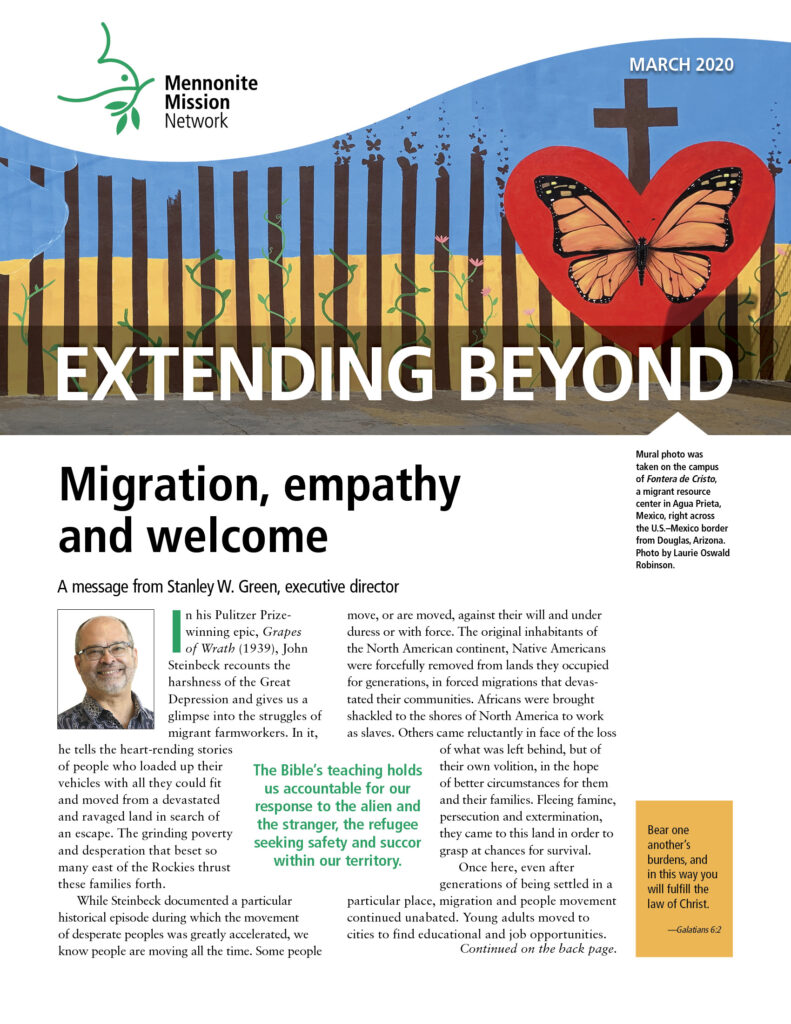In his Pulitzer Prize-winning epic, Grapes of Wrath (1939), John Steinbeck recounts the harshness of the Great Depression and gives us a glimpse into the struggles of migrant farmworkers. In it, he tells the heart-rending stories of people who loaded up their vehicles with all they could fit and moved from a devastated and ravaged land in search of an escape. The grinding poverty and desperation that beset so many east of the Rockies thrust these families forth.
While Steinbeck documented a particular historical episode during which the movement of desperate peoples was greatly accelerated, we know people are moving all the time. Some people move, or are moved, against their will and under duress or with force. The original inhabitants of the North American continent, Native Americans were forcefully removed from lands they occupied for generations, in forced migrations that devastated their communities. Africans were brought shackled to the shores of North America to work as slaves. Others came reluctantly in face of the loss of what was left behind, but of their own volition, in the hope of better circumstances for them and their families. Fleeing famine, persecution and extermination, they came to this land in order to grasp at chances for survival.
Once here, even after generations of being settled in a particular place, migration and people movement continued unabated. Young adults moved to cities to find educational and job opportunities. Families moved in the 1960s and 1970s to suburbs in search of more space and a "more secure" livelihood. Blacks moved from the south to the north to escape the denial of their civil rights. Mobility is a defining feature of the American ethos. On average, people move, or migrate, more than 10 times in their lives. (According to a study conducted by the U.S. Census Bureau, the average person will move their household 11.7 times in their lifetime.)
Everywhere that people have moved, they yearn to find welcome. They yearn for hospitality that will ease the loss of all they have left behind, the severing from that which was familiar and known. They need the kind of support that will help them to overcome the trauma of loss, and the tools to navigate in a strange new environment.
Those who moved or migrated within our context did so in search of better opportunities. Today, also, for many of the same reasons, desperate people still come from many places. Will we ignore them because their timing is not right — they chose the wrong era in which to move? Or will we recognize their predicament as the common plight of our forebears, many of whom came in quite similar circumstance? Our response to this question of how we will receive and treat the vulnerable and desperate is, to be sure, an undeniable measure of our humanity and compassion. Can we empathize with those whose circumstance mirrors our own, even if removed by a few generations? More importantly, our response to the suffering and struggle of displaced and distressed people is also an authentication of our Christian confession. Or not.
The Bible’s teaching holds us accountable for our response to the alien and the stranger, the refugee seeking safety and succor within our territory (Deuteronomy 10:19, Leviticus 19:34). Our Lord, Jesus of Nazareth, was himself a refugee in his infancy and cares deeply for those in like circumstance. He calls us to do likewise.
We are grateful for those who are seeking thoughtful, compassionate responses to the issues that immigration present us with as a nation. We pray for their important work. Meanwhile, as people come, we must respond with humanity and care as is reflected in the stories included here. Mennonite Mission Network is grateful for your sharing and support that helps us together respond in the way of Jesus. We are all pilgrims on a journey; let us help each other to reach home whole.
Stanley W. Green
Executive Director

